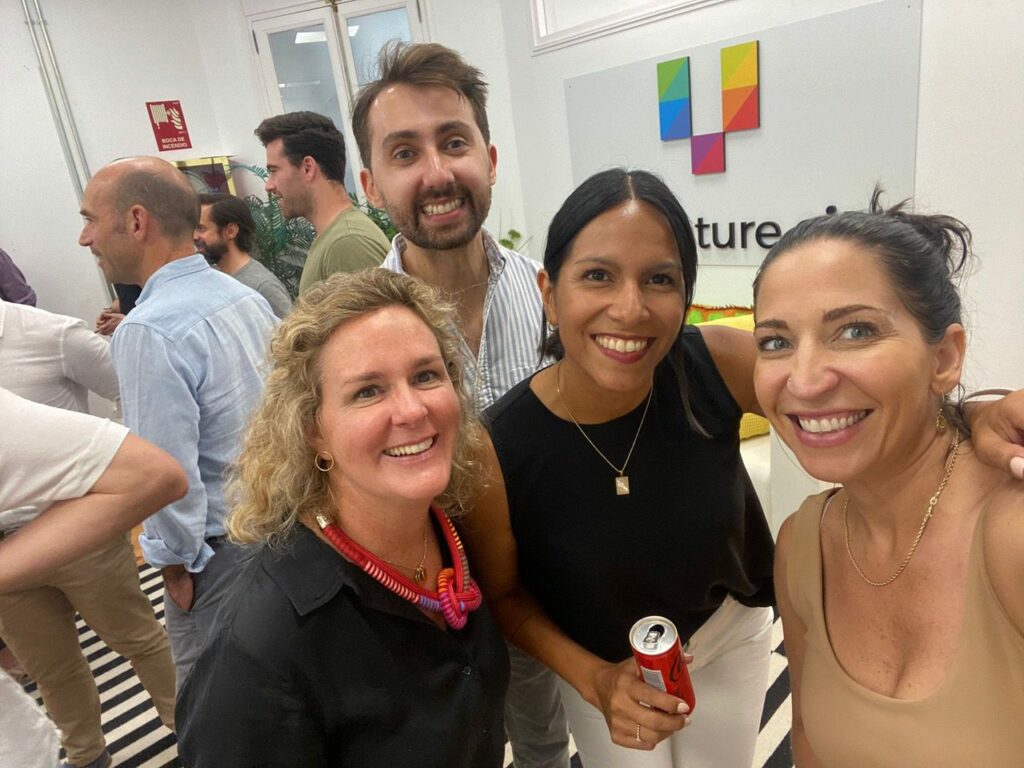Hear from some of the entrepreneurs, investors, and community builders that are building bridges between these innovative cities
By Riley Kaminer
A bridge is being built across the Atlantic, and it’s completely digital.
As the growth in the Miami tech scene has skyrocketed since the onset of the pandemic, so has that of Madrid. The Spanish capital has seen an influx of talent, much thanks to the slightly more relaxed shelter-at-home restrictions compared to cities such as Barcelona. Dealroom pins the overall value of the Spanish tech ecosystem at €93 billion – up 3.6x since 2018.
At the recent South Summit conference, a delegation of Miami-based technologists highlighted some of the parallels between our tech ecosystems, and the accompanying opportunities.
Argentine entrepreneur Alec Oxenford, who has deep connections in both Miami and Madrid, summarized the main aspects we have in common:
- Both cities thrived in a context where remote work became the norm in tech circles.
- Both cities have several startup unicorns.
- There are vibrant cultural scenes in both places.
- The weather attracts lots of tourists who often end up moving there.
- Their local airports are great regional hubs. This is especially advantageous, in his opinion, since New York and Latin America are very accessible from Miami – while all the European hubs are easy to visit from Madrid.

Latin America’s entry points to Europe and the US
Latin America plays a major role in both cities.
“Much like Ironhack, which began in Madrid and expanded to Miami in 2014, numerous tech startups and scaleups view Miami as a gateway to the U.S. and Latin American markets,” Ironhack CEO Ariel Quiñones, a Madrid-Miami pioneer, told Refresh Miami.
“As Miami is the landing pad for Latin American entrepreneurs to enter the US market, so is Madrid the bridge between Latin America and the EU,” commented IDC Ventures’ Managing Director Bobby Aitkenhead. He added that this is true both for Latin American companies seeking funding from international investors as well as startups looking to expand their offerings to US or EU-based customers.
“Culturally, there is a strong connection between Madrid and Miami, as many Latino entrepreneurs in Miami have connections in Madrid and vice versa,” noted Emilio Escartin, the Partner for Europe at Coconut Grove-based Fuel Venture Capital. Escartin, who lives in Madrid, is also a Professor of Finance at IE Business School.
“Spanish startups in particular will be able to leverage cultural and geographical connections with the American and Latin American markets – opening doors to significant growth opportunities,” shared ClimateTrade’s Fran Benedito. One year ago, the company established a Miami headquarters to expand its decarbonization platform stateside.

Expanding to the US through Miami – and the EU through Madrid
For many Spanish startups like ClimateTrade, Miami offers a unique opportunity to enter the US market. This is equally true for Miami startups looking to launch in Europe.
“For Spaniards, Miami serves as an ideal entry point due to the robust local Spanish diaspora, cultural affinities with the Latin community, and a lifestyle that aligns well with theirs,” said Ironhack’s Quiñones. “Furthermore, we’ve observed U.S. companies from Miami expressing interest in initiating their Europe-based operations in Spain.”

Dileep Thazhmon, CEO and founder of global fintech Jeeves, which has a major presence both in Miami and Madrid, echoed these sentiments: “The natural bridge between Miami and Madrid offers a unique opportunity for countries operating in these ecosystems to collaborate and exchange services, expertise, and networks.”
“Today, we can find a wide variety of companies operating between Miami and Madrid, ranging from multinational corporations such as Telefónica, Microsoft, IBM, to well-known startups like Jobandtalent, TravelPerk, and Carto,” Thazhmon continued. “The successful integration of Miami and Madrid’s tech ecosystems is paving the way for companies to tap into the potential of three major markets: the US, Europe, and Latin America.”
MedUX is one example of a Spanish company that has recently expanded to the Americas through Miami. Madrid-based CMO Rafael González told us that their new Miami office has “fortified MedUX’s Spanish-American nexus.”
“MedUX consolidates its presence and activity throughout the American continent thanks to this move. All in all, this collaboration and exchange, is fueling our international growth and helps consolidate our leading position in the Latin America region and expand our network testing and monitoring solutions to a broader market.”
However, Marcos Latorre Díez, the CEO of Hiberus International, notes that there is still room for improvement. “Hiberus, for example, has just landed in Miami, and there is no specialized technological organization that can help us take the first steps. We must turn to general foreign trade institutions, but technology often requires a different approach.”
Leveraging the transatlantic investment opportunity
“Given the mature VC and PE capital markets in the U.S., founders leverage Miami to present their companies as viable investment opportunities to U.S. investors,” said Ironhack’s Quiñones.
TheVentureCity, IDC Ventures, Fuel Venture Capital, and Marcelo Claure’s Bicycle Capital are just some of the investors that have a meaningful presence in both ecosystems.
Equally Madrid’s investment landscape provides an exciting opportunity for Miami startups as the home to major VCs.
“Madrid’s thriving VC scene, with firms like Fuel Venture Capital, Seaya Ventures, Kibo Ventures, KFund, Encomenda, Swaanlab, JME Ventures, TheVentureCity, Alliron, Samaipata, Convexo VC, and Bicycle Capital are also worth exploring,” noted Fuel’s Escartin.
“There is a clear match between VC entrepreneurship and investment in both cities, as many Spanish or Latino entrepreneurs in Madrid have roots in Miami (business and family traditions),” Escartin continued.

What can people in these two ecosystems do to support each other?
Interested in leveraging the best of both ecosystems? Here’s how.
“To support each other, entrepreneurs and VCs in these ecosystems we can start by co-investing in a bunch of opportunities where the natural market for Madrid is to jump to Miami to continue growing its business (and vice versa), and to co-invest jointly, facilitate access to deal flow, and create long-term links through the physical presence of VC firms and startups in both cities,” said Escartin.
ClimateTrade’s Benedito urged innovators in both ecosystems to “foster networking, facilitate cross-border mentorship, encourage investment collaboration, promote talent exchange, and embrace knowledge sharing.”
Quiñones agreed with this idea of increasing avenues of interactions for members of both tech communities. “This can be achieved through events like eMerge and South Summit, and through business networks such as Endeavor and YPO,” he said.
For Latorre Díez of Hiberus, there is an opportunity to make inroads through professional organizations. “The creation of an association or specialized organization in technology that serves as a nexus between all of us, with the ability to support companies, foster networking, secure financing, and represent both ecosystems would be a great starting point.”
“In my recent experience in Miami, I have encountered a very open ecosystem, full of people willing to collaborate, which would surely welcome the opportunity to organize the connection with the Madrid ecosystem,” Latorre Díez continued. “Companies like Hiberus, with a presence in both cities, could lead those initial relationships.”

RELATED STORY: PART 2
READ MORE IN REFRESH MIAMI:
- #MiamiTech shines at Madrid’s South Summit conference
- Boopos ramps up, firmly on the path to become the investment bank for SMBs
- Hiberus of Spain plants its Americas HQ in Miami
- HR tech unicorn Factorial chooses Miami for its North American hub, plans to hire up to 150
- 10 years after launch, Miami-based Ironhack grows global bootcamp network
- ClimateTrade establishes Miami HQ to expand decarbonization platform stateside
- At TechBeach, building bridges between Latin America, the Caribbean and Miami
- Mana Tech is connecting the Americas, with Downtown Miami as the hub. Here’s how
- SimpliRoute launches supply chain logistics platform in the US, starting with Miami
- Mental wellness startup Nue Life secures $23M funding round for its national expansion
SUPPORT LOCAL NEWS: Refresh Miami is proud to keep our news articles paywall free and accessible to all. If you enjoy our content, please consider supporting us by becoming a paid subscriber or making a donation.
- eMerge win will fuel EVQLV’s growth toward building a future of personalized medicine - April 30, 2024
- Meet one of South Florida’s fastest-growing companies, unlocking Amazon fulfillment at scale - April 29, 2024
- Mexico-born venue marketplace Scouter lands in Miami to plot US expansion - April 25, 2024





